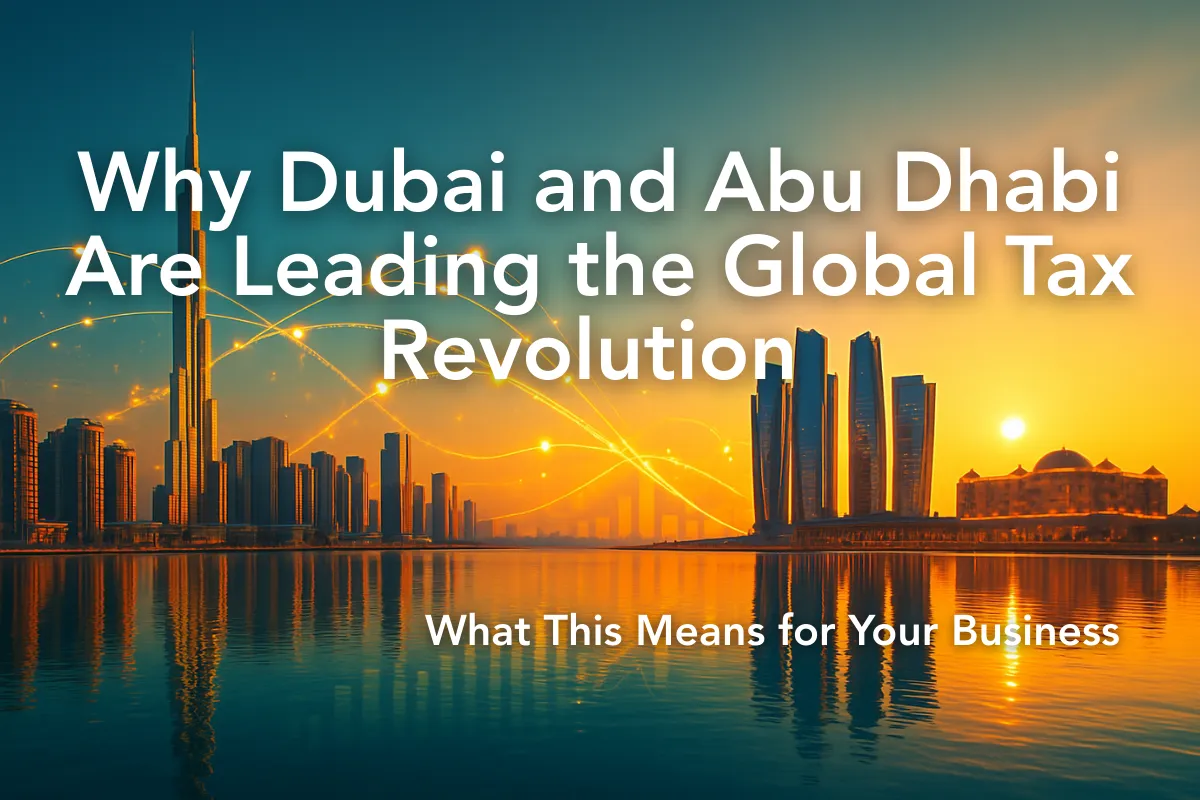
Why Dubai and Abu Dhabi Are Leading the Global Tax Revolution – And What This Means for Your Business
Table of Contents
The Numbers That Are Turning Heads
The business world just received compelling news that's reshaping conversations in boardrooms and co-working spaces alike. According to recent Financial Times reporting, Dubai and Abu Dhabi have secured positions among the world's top 5 most tax-friendly cities for 2025 – a development that extends far beyond regional pride to signal a fundamental shift in global business strategy.
The Numbers That Are Turning Heads
The UAE's tax framework presents a compelling value proposition that's difficult to ignore:
Personal taxation: Zero percent personal income tax continues to attract entrepreneurs and executives seeking to maximize their earnings retention.
Corporate landscape: The 9% corporate tax rate positions the UAE among the most competitive jurisdictions globally, while many developed economies maintain rates exceeding 20-30%.
Investment protection: No taxation on capital gains or foreign income creates an environment where international investments can flourish without punitive fiscal barriers.
Business flexibility: The absence of restrictions on profit repatriation enables companies to manage global cash flows with unprecedented freedom.

Strategic Implications for Modern Businesses
This ranking represents more than favorable taxation – it reflects a comprehensive approach to business facilitation that modern entrepreneurs are increasingly prioritizing.
For established businesses operating in high-tax jurisdictions, the UAE framework offers a pathway to international expansion that doesn't compromise profitability through excessive fiscal obligations. This isn't about tax avoidance – it's about strategic optimization within fully compliant structures.
Digital entrepreneurs and remote business owners find particular value in jurisdictions that recognize the borderless nature of modern commerce. The UAE's approach acknowledges that today's businesses often serve global markets while maintaining operational flexibility.
Investment professionals and high-net-worth individuals benefit from structures that preserve capital growth while providing access to one of the world's most dynamic business hubs.
The Broader Context
What makes this development particularly significant is its timing. As many jurisdictions increase tax burdens to address post-pandemic fiscal pressures, the UAE continues demonstrating that competitive taxation can coexist with robust infrastructure, regulatory clarity, and business support systems.
This approach extends beyond mere rate competition. The UAE has invested heavily in creating comprehensive ecosystems that support business operations – from world-class infrastructure to streamlined regulatory processes that facilitate rather than hinder business development.

Practical Considerations
For businesses evaluating their options, several factors warrant consideration:
Operational alignment: Success in any jurisdiction requires genuine business substance and operational alignment with local requirements. The UAE's various free zones offer frameworks suited to different business models and operational needs.
Compliance framework: While the tax environment is favorable, businesses must ensure full compliance with all regulatory requirements. Professional guidance becomes essential in navigating these frameworks effectively.
Strategic fit: The decision to establish operations in any jurisdiction should align with broader business objectives, market access requirements, and operational considerations beyond taxation alone.
Looking Forward
The UAE's continued recognition as a tax-friendly destination reflects a sustained commitment to maintaining competitive business environments. For entrepreneurs and business leaders evaluating their strategic options, this ranking provides additional validation of the UAE's position in the global business ecosystem.
However, successful international expansion requires more than favorable taxation. It demands comprehensive planning, professional guidance, and alignment between business objectives and jurisdictional capabilities.
As the global business landscape continues evolving, jurisdictions that combine competitive frameworks with robust support systems will likely continue attracting international business activity. The UAE's performance in this ranking suggests it remains well-positioned to serve this role.
For businesses considering their next strategic move, the question isn't just about where taxes are lowest – it's about where comprehensive business success is most achievable. The UAE's latest recognition suggests it continues making a compelling case for both considerations.
Are you exploring international business opportunities or seeking to optimize your current structure? Understanding how different jurisdictions align with your business objectives requires careful analysis and professional guidance. Click here to book a free consultation to learn more about how it's done.
